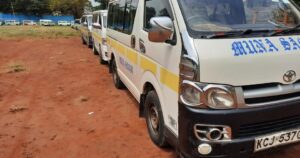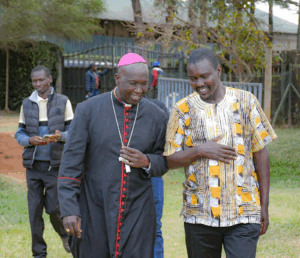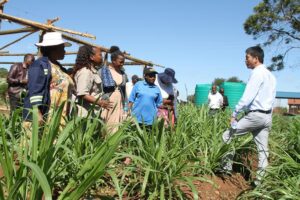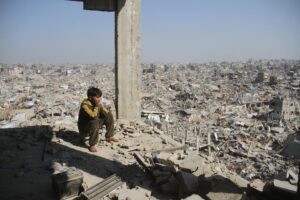Governor Waiguru Scales Up Water Supply for Over 30,000 Residents
In the financial year 2024/2025 alone, 37 water projects were completed, including the Kiorugari Water Project in Nyangati, Rukenya Irrigation Project

The program is designed to enhance climate resilience through empowering counties and local communities to develop and implement their own climate adaptation plans. Photo/KBC Digital
By Juliet Jerotich
Kirinyaga Governor Anne Waiguru has reaffirmed her administration’s determination to provide locals with clean and dependable water, saying her government is planning to start 42 new water projects in the current financial year.
The ambitious project will be carried out in all the 20 wards, and more than 30,000 residents will be directly impacted, with each project aiming to serve between 300 and 500 individuals. The project, according to Governor Waiguru, will involve the drilling of boreholes with solar systems, laying of new water pipes, building and installing tanks, and rehabilitation of water intakes to offer regular supply to homes, farms, and schools.
In addition, the county is integrating water supply with climate-smart interventions within the Financing Locally-Led Climate Action (FLLoCA) program. The program is designed to enhance climate resilience through empowering counties and local communities to develop and implement their own climate adaptation plans. “Every home deserves clean drinking water, every farmer needs irrigation support, and no child should stay home from school due to dirty water. That is the Kirinyaga we dream of,” Waiguru concluded.
The county government has already achieved great milestones in the previous year. In the financial year 2024/2025 alone, 37 water projects were completed, including the Kiorugari Water Project in Nyangati, Rukenya Irrigation Project in Kabare, and Kugeria Water Project in Murinduko. Last year, six boreholes were drilled, with another five ongoing to boost supply even further.
County Executive Committee Member for Environment, Water, and Irrigation, James Kinyua, addressed the positive impacts of such programs, quoting that they are curbing water shortages and boosting farm productivity. “The Jiinue Rupingazi Water Project is a good example. Families can now irrigate their farms and have clean water for domestic use,” said Kinyua.
In Kamucege Primary School in Gathigiriri Ward, a borehole is providing safe water for 420 students. Principal Charles Weru revealed that the facility has greatly reduced absenteeism caused by bilharzia and other waterborne illnesses.
The locals are also witnessing the impact. Florence Muthoni from Bahati village explained how over 700 households now have water access at their doorsteps. “Earlier we would draw water from canals through the use of donkeys. Now we have taps at home. Women are less fatigued, and our kitchen gardens are flourishing,” she explained.
Traders are also reaping the benefits. John Wachira, a Kibingo trader in Inoi Ward, noted that one borehole supplies more than 1,200 people with constant supply even in dry seasons.
Besides boreholes, the county has distributed 20 tanks of 10,000-litre capacity to help communities harvest rainwater. This has improved food security by enabling families to grow vegetables and cut down on food expenses.
Governor Waiguru made the provision of clean water a top agenda, linking it to better health, sustainable agriculture, and an improved quality of life for Kirinyaga’s people.







